英文演讲课件-城市化
- 格式:ppt
- 大小:4.14 MB
- 文档页数:10

城市化的负面影响(英文演讲稿)The negative effects of urbanizationThere are many advantages of urbanization. However,there are also many disadvantages of urbanization.The negative influence on the environment.Water pollutionUrban water pollution is mainly caused by industrial waste water and domestic sewage. [dəˈmestik ˈsu:ɪdʒ]生活污水。
Please look at the picture on the topright.From 2006 to 2012 the number of domestic sewage becomes bigger and bigger.And the number of industrial waste water remain stable.But the total amount is increasing.Look at the picture on the lower right.We can see that the ability of treating the urban waste water have improved year by year.But,compared with the increase of the number of urban waste water,the ability of treati ng polluted water haven’t improved.Air pollutionNowadays,haze weather has become a daily one in large part of China.With the development of urbanization,the number of cars in china are growing rapidly.Besides China is a coal-based energy structure. V ehicle [ˈvi:hɪkl] exhaust and coal firing seriously pollute the air.The negative influence on the society.Noise pollution.In the city,we'll be disturbed [dɪˈstɜ:rbd] by jet airplanes,car horns ['hɔ:nz] , oil-powered engines,the noise from building sites and so on.The noise makes us upset and reduce the quality of our life.Traffic jamWith the fast development of our economy and living standard ,the number of vehicles is rising sharply. However, the road condition needs improving. It has seriously influenced people's daily life and economic development.Bad influence on agricultural development.Many farmers go to cities to work,and many of them have abandoned agriculture.It’s bad for agricultural devel opment.Social conflictsIn the process of building a city,many houses will be pulled down.In the process,there are many contradictions [kɒntrə'dɪkʃnz]矛盾 between people and local government.What’s more, there are also lots of conflicts between migrant [ˈmaɪɡrənt] workers and developers.For example,the contradiction of wages ['weɪdʒɪz].。

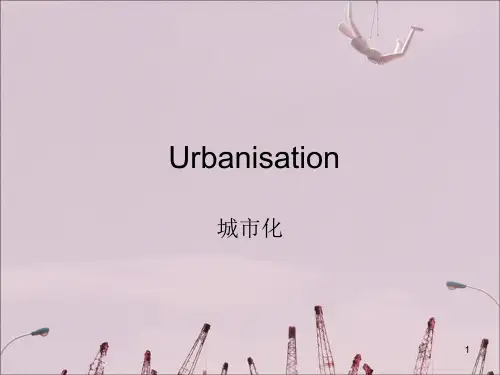
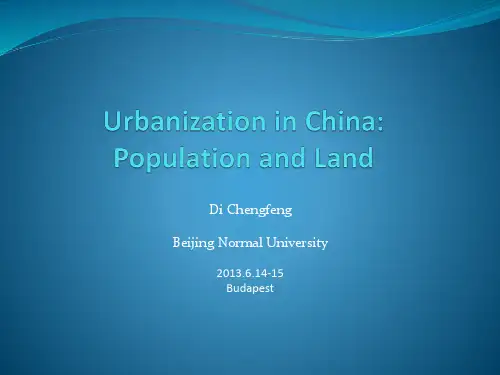
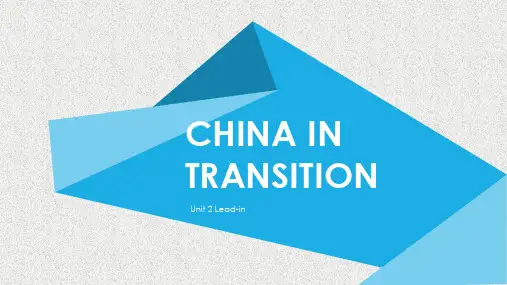
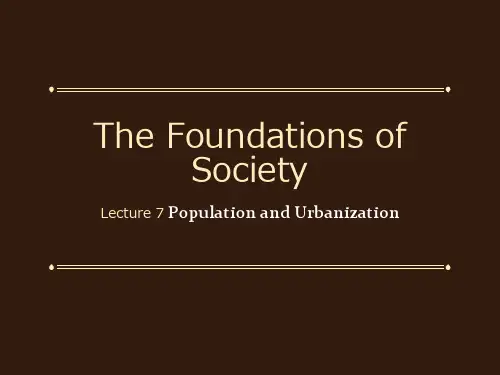
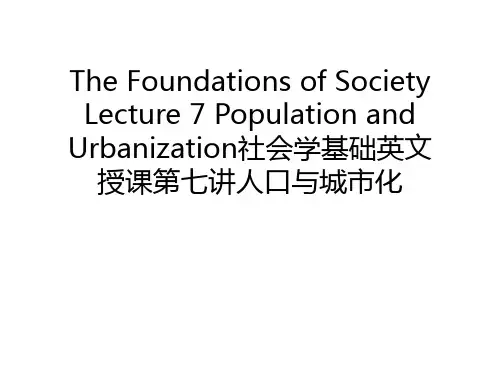
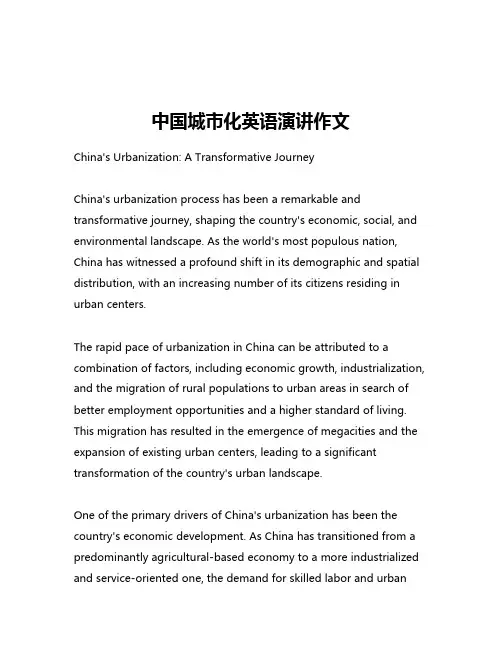
中国城市化英语演讲作文China's Urbanization: A Transformative JourneyChina's urbanization process has been a remarkable and transformative journey, shaping the country's economic, social, and environmental landscape. As the world's most populous nation, China has witnessed a profound shift in its demographic and spatial distribution, with an increasing number of its citizens residing in urban centers.The rapid pace of urbanization in China can be attributed to a combination of factors, including economic growth, industrialization, and the migration of rural populations to urban areas in search of better employment opportunities and a higher standard of living. This migration has resulted in the emergence of megacities and the expansion of existing urban centers, leading to a significant transformation of the country's urban landscape.One of the primary drivers of China's urbanization has been the country's economic development. As China has transitioned from a predominantly agricultural-based economy to a more industrialized and service-oriented one, the demand for skilled labor and urbaninfrastructure has increased dramatically. This has led to the development of thriving industrial hubs, commercial centers, and transportation networks, which have in turn attracted a large influx of people seeking employment and better living conditions.The growth of China's urban centers has also been facilitated by government policies and initiatives aimed at promoting urbanization. The central government has implemented various measures, such as the establishment of special economic zones, the provision of incentives for businesses to relocate to urban areas, and the investment in large-scale infrastructure projects, to support the development of cities and foster economic growth.However, the rapid pace of urbanization in China has also brought about numerous challenges that the country must address. One of the most pressing issues is the strain on urban infrastructure and resources, as the influx of people has placed a significant burden on housing, transportation, healthcare, and other public services. This has led to the emergence of urban sprawl, traffic congestion, and environmental degradation, which have had a profound impact on the quality of life for urban residents.To address these challenges, the Chinese government has implemented a range of policies and initiatives aimed at promoting sustainable urbanization. This includes the development of eco-cities,the investment in renewable energy sources, the promotion of public transportation, and the implementation of urban planning strategies that prioritize the efficient use of resources and the preservation of the environment.Furthermore, the Chinese government has also recognized the importance of addressing the social and economic disparities that have arisen as a result of urbanization. Policies have been implemented to improve access to education, healthcare, and social welfare services for urban residents, particularly those from lower-income backgrounds. Additionally, efforts have been made to integrate rural migrants into urban communities and provide them with the necessary support to thrive in the urban environment.Despite the challenges, China's urbanization process has also presented numerous opportunities for the country's development. The concentration of people, resources, and economic activities in urban centers has enabled the country to leverage economies of scale, foster innovation, and drive economic growth. Moreover, the development of urban centers has also contributed to the improvement of living standards for many Chinese citizens, providing them with access to better healthcare, education, and cultural amenities.In conclusion, China's urbanization journey has been a complex andmultifaceted process, marked by both successes and challenges. As the country continues to evolve and adapt to the changing demands of its urban centers, it will be essential for the government, policymakers, and urban planners to work together to address the pressing issues and capitalize on the opportunities presented by this transformative process. By doing so, China can ensure that its urban centers continue to thrive and provide a high quality of life for its citizens, while also contributing to the country's overall economic and social development.。
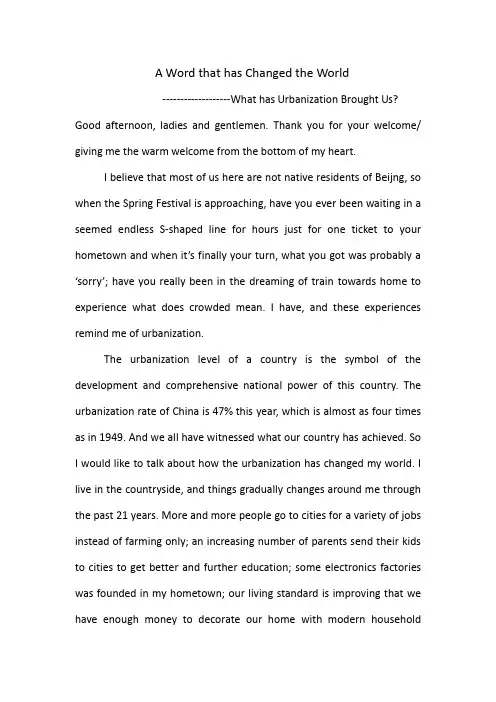
A Word that has Changed the World-------------------What has Urbanization Brought Us? Good afternoon, ladies and gentlemen. Thank you for your welcome/ giving me the warm welcome from the bottom of my heart.I believe that most of us here are not native residents of Beijng, so when the Spring Festival is approaching, have you ever been waiting in a seemed endless S-shaped line for hours just for one ticket to your hometown and when it’s finally your turn, what you got was probably a ‘sorry’; have you really been in the dreaming of train towards home to experience what does crowded mean. I have, and these experiences remind me of urbanization.The urbanization level of a country is the symbol of the development and comprehensive national power of this country. The urbanization rate of China is 47% this year, which is almost as four times as in 1949. And we all have witnessed what our country has achieved. So I would like to talk about how the urbanization has changed my world. I live in the countryside, and things gradually changes around me through the past 21 years. More and more people go to cities for a variety of jobs instead of farming only; an increasing number of parents send their kids to cities to get better and further education; some electronics factories was founded in my hometown; our living standard is improving that we have enough money to decorate our home with modern householdappliances and travelling around the world is no longer a dream. Besides these, urbanization also brought us high-tech and better medical care. It has changed our way of living.Now we are all living in Beijing, a big city with a very high urbanization level. But have you ever concerned about being in the sun because of the hole of the ozone; have you ever paid more attention to the air because we do not know what chemicals are in there; have you ever been worried about the fish we eat because the fish may be full of cancers. All the above means urbanization does not always bring us significant consequences and desirable outcomes.Facing these problems, suburban urbanization and counter urbanization have already taken place in many developed countries, which shows us a way. I believe that if we abide by the principle of protecting while developing, with the appropriate urbanization level, we can live in a real harmonious world.Thank you for listening.。
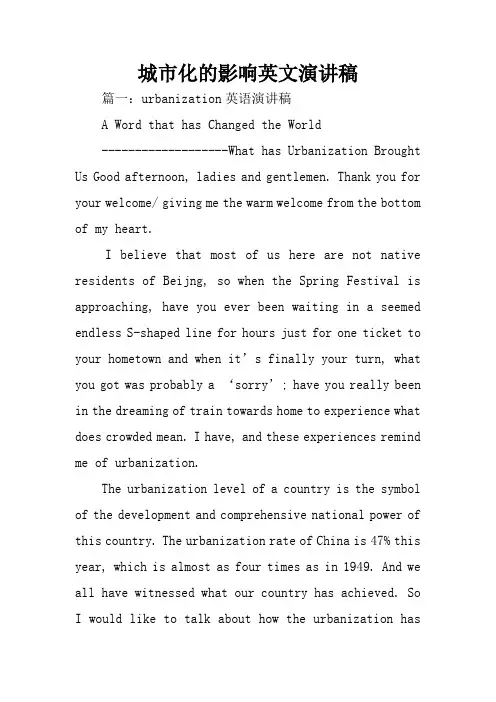
城市化的影响英文演讲稿篇一:urbanization英语演讲稿A Word that has Changed the World-------------------What has Urbanization Brought Us Good afternoon, ladies and gentlemen. Thank you for your welcome/ giving me the warm welcome from the bottom of my heart.I believe that most of us here are not native residents of Beijng, so when the Spring Festival is approaching, have you ever been waiting in a seemed endless S-shaped line for hours just for one ticket to your hometown and when it’s finally your turn, what you got was probably a ‘sorry’; have you really been in the dreaming of train towards home to experience what does crowded mean. I have, and these experiences remind me of urbanization.The urbanization level of a country is the symbol of the development and comprehensive national power of this country. The urbanization rate of China is 47% this year, which is almost as four times as in 1949. And we all have witnessed what our country has achieved. So I would like to talk about how the urbanization haschanged my world. I live in the countryside, and things gradually changes around me through the past 21 years. More and more people go to cities for a variety of jobs instead of farming only; an increasing number of parents send their kids to cities to get better and further education; some electronics factories was founded in my hometown; our living standard is improving that we have enough money to decorate our home with modern householdappliances and travelling around the world is no longer a dream. Besides these, urbanization also brought us high-tech and better medical care. It has changed our way of living.Now we are all living in Beijing, a big city with a very high urbanization level. But have you ever concerned about being in the sun because of the hole of the ozone; have you ever paid more attention to the air because we do not know what chemicals are in there; have you ever been worried about the fish we eat because the fish may be full of cancers. All the above means urbanization does not always bring us significant consequences and desirable outcomes.Facing these problems, suburban urbanization and counter urbanization have already taken place in many developed countries, which shows us a way. I believe that if we abide by the principle of protecting while developing, with the appropriate urbanization level, we can live in a real harmonious world.Thank you for listening.篇二:经典英文演讲稿I believe in our futureHonorable Judges, fellow students:Good afternoon!Recently, ther is a heated debate in our society. The college students are the beneficiaries of a rare privilege, who receive exceptional education at extraordinary places. But will we be able to face the challenge and support ourselves against all odds Will we be able to better the lives of others Will we be able to accept the responsibility of building the future of our countryThe cynics say the college students are the pampered lost generation, which would cringe at the slightest discomfort. But the cynics are wrong. Thecollege students I see are eagerly learning about how to liveindependently. We help each other clean the dormitory, go shopping and bargain together, and take part time jobs to supplement our pocket cynics say we care for nothing other than grades; and we neglect the need for character cultivation. But again, the cynics are wrong. We care deeply for each other, we cherish freedom, we treasure justice, and we seek truth. Last week, thousands of my fellow students had their blood type tested in order to make a contribution for the children who suffer from blood cancer.As college students, we are adolescents at the critical turning point in our lives. We all face a fundamental choice: cynicism or faith, each will profoundly impact our future, or even the future of our country. I believe in all my fellow classmates. Though we are still inexperienced and even a little bit childish. I believe that we have the courage and faith to meet any challenge and take on our responsibilities. We are preparing to assume new responsibilities and tasks, and to use the education we have received to makeour world a better place. I believe in our future.我对未来充满信心尊敬的评委,各位同学:下午好!最近,社会上有一场很激烈的争论。
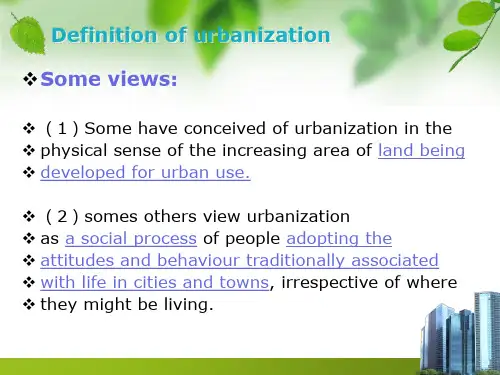
以中国的城市化的演讲为主题英文作文China's Urbanization: A Transformative JourneyChina's remarkable journey of urbanization has been a testament to the country's unwavering commitment to economic growth and social development. Over the past few decades, the country has witnessed a profound transformation, as its cities have expanded, modernized, and become hubs of innovation and economic prosperity. This process has not only reshaped the physical landscape of China but has also had a profound impact on the lives of its people.At the heart of China's urbanization lies the government's strategic vision to create a more balanced and sustainable development model. The government has recognized the crucial role that cities play in driving economic growth and improving the quality of life for its citizens. As a result, it has implemented a series of policies and initiatives aimed at promoting urban development, including investments in infrastructure, the provision of affordable housing, and the implementation of environmental regulations.One of the most significant drivers of China's urbanization has beenthe country's rapid economic growth. The country's transition from a primarily agrarian economy to a more industrialized and service-oriented one has led to a massive influx of people from rural areas to urban centers, seeking better employment opportunities and a higher standard of living. This migration has been facilitated by the government's efforts to improve transportation networks, provide access to education and healthcare, and create economic incentives for businesses to establish themselves in urban areas.The transformation of China's cities has been nothing short of remarkable. Once-sleepy provincial towns have been transformed into bustling metropolises, complete with towering skyscrapers, modern transportation systems, and thriving commercial districts. These cities have become hubs of innovation, attracting both domestic and international talent, and driving the country's technological and economic advancement.However, the rapid pace of urbanization has also brought about a number of challenges that the government and local authorities must address. One of the most pressing issues is the strain on urban infrastructure, as the influx of people has put a significant burden on housing, transportation, and public services. The government has responded by investing heavily in the construction of new housing, the expansion of public transportation networks, and the improvement of urban planning and management.Another challenge is the environmental impact of urbanization. The rapid growth of cities has led to increased energy consumption, air pollution, and the generation of waste. The government has implemented a range of policies and initiatives to address these issues, including the promotion of renewable energy, the implementation of stricter environmental regulations, and the investment in waste management and recycling programs.Despite these challenges, China's urbanization has also brought about a number of positive outcomes. The growth of cities has led to the emergence of a large and increasingly affluent middle class, which has fueled the development of a vibrant consumer market and driven the growth of the service sector. Additionally, the concentration of people and resources in urban areas has facilitated the development of new technologies and the creation of innovative business models, further propelling China's economic transformation.Moreover, the urbanization process has also had a significant impact on the lives of China's citizens. The improvement of access to education, healthcare, and other public services has led to a significant improvement in the quality of life for many people. Additionally, the growth of urban centers has provided new opportunities for cultural exchange and the promotion of social cohesion, as people from diverse backgrounds come together to liveand work in these dynamic and vibrant communities.In conclusion, China's urbanization journey has been a complex and multifaceted process, marked by both challenges and opportunities. As the country continues to evolve and adapt to the demands of a rapidly changing world, it is clear that the role of cities will only become more crucial in shaping the country's future. By addressing the challenges of urbanization and harnessing its potential, China can continue to build a more prosperous, sustainable, and equitable society for all its citizens.。
英语作文城市化With the rapid development of urbanization, more and more people are moving from rural areas to cities in search of better opportunities and a higher quality of life. This trend has led to the expansion of cities and the growth of urban populations.The process of urbanization has brought about both positive and negative effects. On the one hand, citiesoffer better access to education, healthcare, and employment opportunities. People living in cities also enjoy a more convenient lifestyle with access to modern amenities and services.However, urbanization has also led to overcrowding, pollution, and increased pressure on infrastructure and resources. The rapid expansion of cities has resulted in the destruction of natural habitats and the loss of green spaces. Traffic congestion, air pollution, and waste management issues are also common problems in urban areas.Despite these challenges, urbanization is inevitable as more and more people are drawn to cities in search of a better life. It is important for governments to plan and manage urban growth effectively to ensure sustainable development and a high quality of life for all residents.In conclusion, urbanization is a complex process that brings both opportunities and challenges. While citiesoffer a wealth of opportunities for economic and social development, it is important to address the negative impacts of urbanization and work towards creating sustainable and livable cities for future generations.。